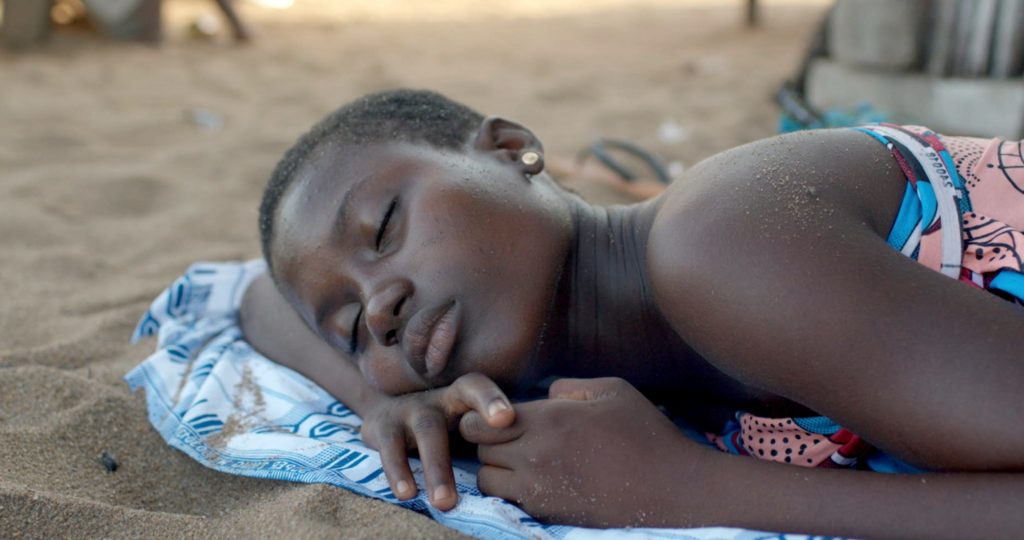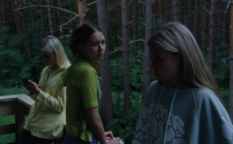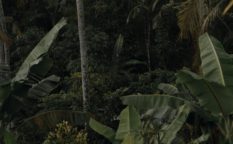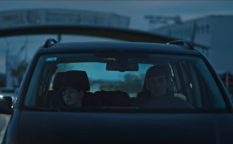Cannes review: Aya (2021)
Cannes Film Festival
L’Acid

Simon Coulibaly Gillard’s fiction feature debut Aya wouldn’t be a subject of review on Ubiquarian if it wasn’t largely borrowing from the documentary style. There is barely a moment in the film which feels like fiction. The circumstances it depicts are authentic, the actors are amateurs who re-act their real life situations, and the pulsating village life penetrates the screen on its own accord, not giving a damn about some film being shot on its ground.
The titular character Aya (Marie-Josée Degny Kokora) lives with her mom (Patricia Egnabayou) and baby brother in the coastal village Avikam on the Ivorian island Lahou that is heavily impacted by climate change. Family in real life, their intereaction in front of the camera is smooth, leaning on trust and commodity of unforced dynamics. Based on their own thoughts and experiences, mother-daughter talks about first love, daily duties and life and death run effortlessly, even when they touch upon a sensitive subject such as the painful absence of husband and father who has recently perished while fishing on the open sea. It is palpable that the story was bulit after the family was consulted about their own ideas how to shoot certain scenes, and what to add to the ‘script’. Speaking of which – there wasn’t any script in the first place. It wrote itself, so to say, in the filmmaking process.
From the western perspective, life conditions on the island could be described as precarious, but the only thing that bothers its inhabitants is the prospect of having to leave their homes rather sooner than later. The fact that they are allowed to fish and grow cassava, but not to sell any of it as they can only exchange goods, is not addressed even once. Lahou is home, good as a home can be.
The elders are worried about one thing only, and that’s their topic every time they meet – the fast approaching danger of water swallowing the village. One of them says: “When I was little, cemetary was so far from the ocean, it was a two-hour walk to the shore (..) It took a day to walk around the island”. As they recall old times compairing them to the now, their biggest sorrow is how to transfer the remains of their family members from the graveyard to new destinations. Many bones rest in tombs on the burial ground, and one by one, those who depart organize ceremonies in which they first explain to their dead relatives why their peace has to be distrubed.
The Graveyard and the church are the last remaining witnesses of Avikam’s architectural past. Cottages have long replaced proper, solidly built houses on Lahou out of necessity to move them further away from the rising river from one, and the ocean from the other side of the village. Simon Coulibaly Gillard’s camera finely tunes the contrast between the past and the present by smoothly changing focus from the traces of colonial past to the buzzing village life in all its modesty. The lense captures the cheerfull youth pranking around, and the weather-bathered faces of their elderly relatives.
The scenes shot at night are dreamy, and provoke a sense of nostalgia about the island life that soon will be no more. Even during the day, such emotions are given through Aya’s slumber on the sandy beach.
Aya is not only a film that points out at the consequences of climat change. This is also a coming-of-age story about a girl whose life is about to change drastically on another level. Cheerfull, free-spirited and freshly in love, Aya is in denial of the inevitable. She loves her life in Avikam, simple as it is, and her ambitions don’t surpass its borders, much to her mother’s disbelief. What Aya doesn’t know is that the plans for her future are already made, but when she is eventually told what those are, she succumbs to them.
Aya was the closing title of the 74th Cannes Film Festival’s ACID (Independent Cinema Assocation) selection. With its unique style in addressing the burning question of climate change and the consequent displacement of people, the film will probably have a very long journey to a number of festivals across the globe. It could also catapult the acting career of the newcomer Marie-Josée Degny Kokora, who is brilliant in her role as Aya.
Original Title: Aya
Country: France/ Belgium
Language:
Runtime: 90′
Produced by: Michigan Films and KIDAM
Producers: Sébastien Andres, Alice Lemaire, François-Pierre Clavel, Alexadre Perrier
Written/ Directed by: Simon Coulibaly Gillard
With: Marie-Josée Degny Kokora (Aya), Patricia Egnabayou (Patricia), Junior Asse (Junior), Mariam Traore (Coco)
Image & Sound: Simon Coulibaly Gillard
Sound Editing: Clément Chauvelle
Sound Mixing: Anton Vodenitcharov
Colour Grading: Reda Berbar
Editing: Marie-Hélène Mora, Simon Coulibaly Gillard, Bertrand Conard
Co-produced by: RTBF, France Télévisions, Canal + Afrique, Shelter Prod, Dérives
With the Support of: Centre du Cinéma et de L’ Audiovisuel de la Fédération Wallonie-Bruxelles, Taxshelter.be and Ing, Taxshelter of Belgium’s Federal Government, Sabam, First Cut Lab, Belgian Development Cooperation
International Sales: Taskovski Films
















